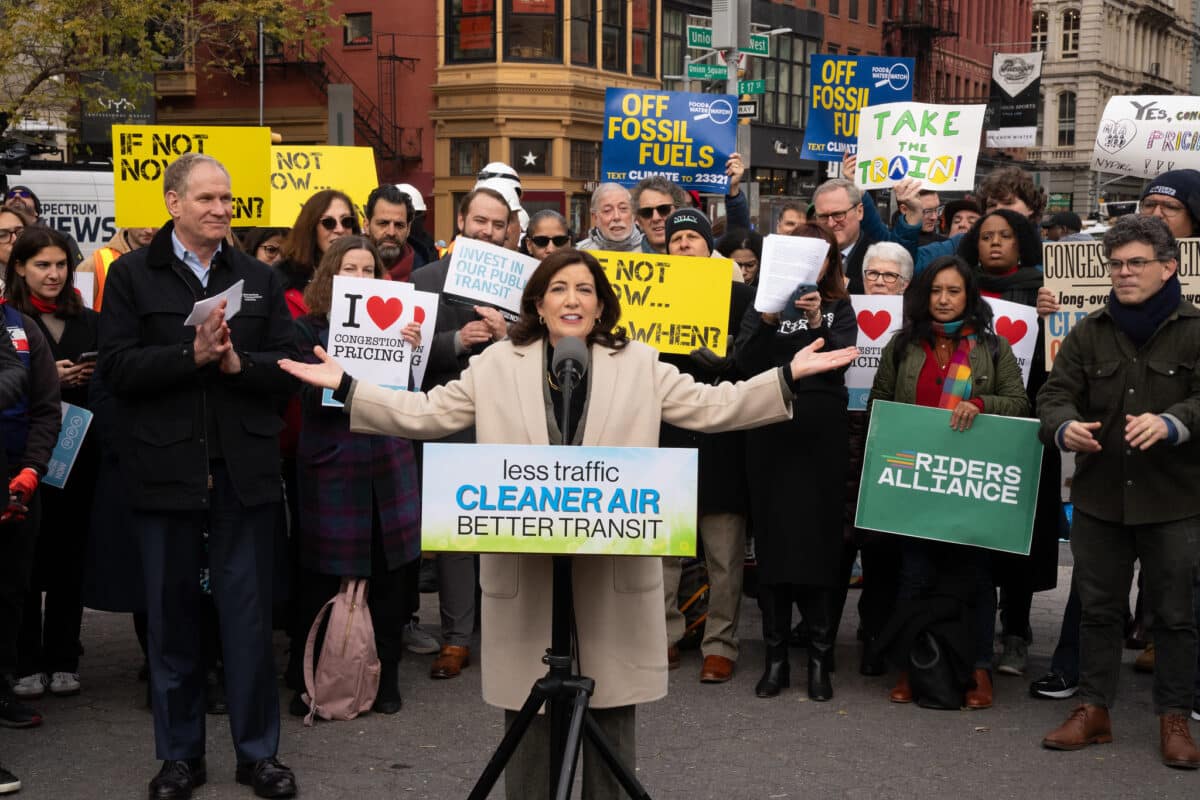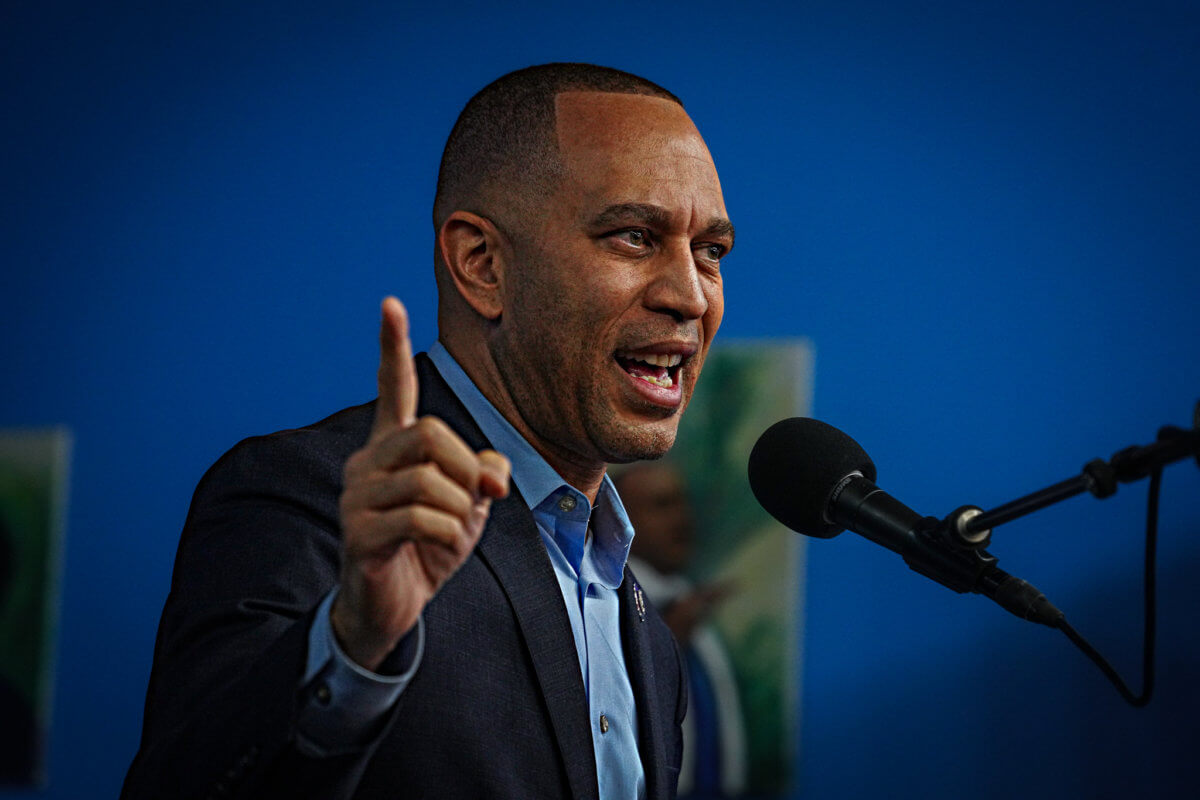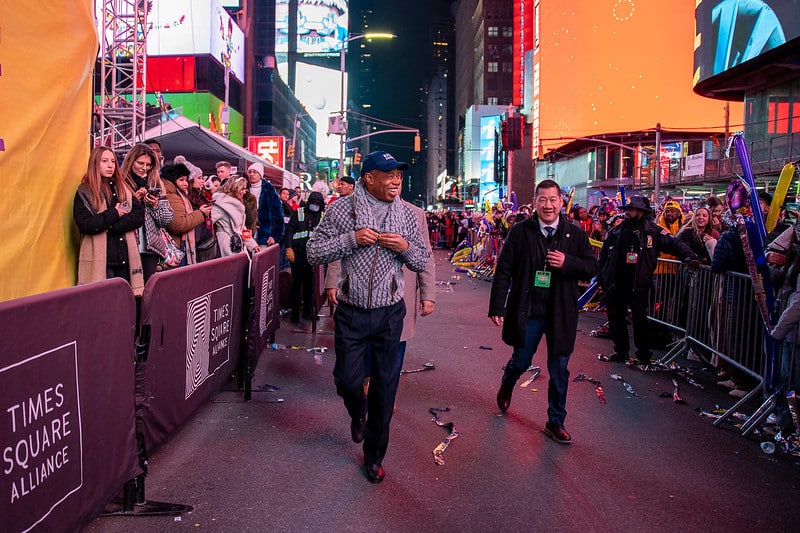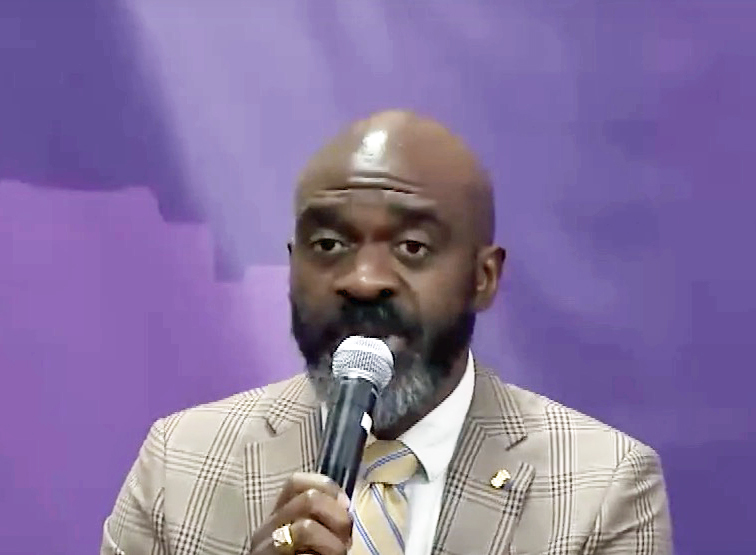With 2023 in the rearview mirror, all eyes will turn to the likely presidential rematch between President Joe Biden and his predecessor, Donald Trump, in the months ahead. But 2024 promises to be a pivotal year in New York politics as well.
Over the next 12 months, the New York political world is likely to see the ongoing federal investigation into Mayor Eric Adams’ 2021 campaign reach a conclusion; a continuing fight between Adams and the City Council over the municipal budget; further impacts of the migrant influx; a jam-packed state legislative session; and several highly competitive Congressional races.
Below are some of the biggest political stories amNewYork Metro is tracking going into the new year.
FBI probe into Adams
Perhaps the biggest question in New York political circles going into the new year is whether Mayor Eric Adams or one of his top aides will be indicted in the federal probe into his campaign finance practices?
The investigation, helmed by the FBI and the U.S. Attorney in the Southern District of New York, is looking at whether the mayor’s campaign conspired with the Turkish government to funnel illegal foreign donations into its coffers in exchange for political favors, according to a search warrant reported by The New York Times.
Neither Adams nor anyone else under scrutiny has been accused of any wrongdoing, and the mayor’s chief counsel, Lisa Zornberg, said last year she has seen “no indication” that he is a target. But federal agents did seize the mayor’s electronic devices, including two phones and an iPad, on a Manhattan street in early November.
Veteran political consultant Hank Sheinkopf predicted that while the federal inquiry will soon come to a head, resulting in more arrests, it ultimately will not touch the mayor himself.
“There are people obviously close to him who are probably under some kind of investigation,” Sheinkopf said. “And it will all come to a conclusion. But there is nothing to indicate the mayor did anything wrong here whatsoever. Today, everything is in the present tense.”
Basil Smikle, former chair of the state Democratic Party who now leads Hunter College’s Public Policy Program, said that while it is unclear how the probe will play out, it would be better for the mayor if it came to a conclusion earlier in the year.
“If you’re the mayor, you hope that it happens early in the year, whatever comes out,” Smikle said. “And that it’s something you can deal with and brush to the side before the summer, because at that point what’s happening nationally is really going to take over a lot of the headlines. And it gives him an opportunity to sort of regroup and forge ahead in a re-election the very next year in 2025.”
The FBI investigation into the mayor’s campaign came into public view when agents searched the home of his former top fundraiser — Brianna Suggs — in early November. One item the feds are focussed on, according to published reports, is whether Adams leaned on the Fire Department to expedite inspections of a Turkish Consulate building before he became mayor in 2021.
City budget and migrants
The coming year is also sure to see a continuation of the battle between Adams and the City Council over Gotham’s budget that has only intensified over the past year.
At issue are 15% across-the-board budget cuts — broken up into three rounds of 5% reductions — that the mayor began implementing when he released his November budget update, along with a hiring freeze. That plan included deep reductions to city services, such as a slowdown in the number of new cops joining the NYPD, the cutting of Sunday public library hours at most branches and a reduction in open free pre-K seats.
The next round of 5% cuts will come in the mayor’s Fiscal Year 2025 preliminary budget, to be released this month, with more on the way when he unveils his executive budget in April. However, the NYPD, FDNY and Sanitation Department have all been spared from the next two rounds.
The mayor argues the cuts are painful but necessary, due to the sizable expense of sheltering and providing for 68,000 migrants currently in the city’s care without additional financial assistance from Washington D.C.
“I am not seeing the light at the end of the tunnel from the federal government,” Adams said, during a Dec. 26 news conference. “And I think we can’t treat this as a policy. We have to treat it as an urgency. I’m just not seeing that energy.”
His budget office contends that migrant costs have left the city with a $7 billion budget deficit over the next fiscal year.
But City Council leadership argues some cuts to vital services can be avoided by utilizing $1.2 billion more in revenue they identified over what was projected by the mayor’s budget office for the current fiscal year. They have also urged the mayor to take a more surgical approach to cutting costs and reduce spending on migrants by moving away from contracting with for-profit companies.
Council Majority Leader Keith Powers (D-Manhattan) told amNewYork Metro that fighting to protect essential services is top of mind for legislative leaders going into the coming round of budget talks.
“I think the council has framed our priorities pretty well,” Powers said. “We want to maintain essential services in the city, we don’t [want to] completely decimate headcount and we [want to] still make sure that programs like 3-K and CUNY are funded in the budget as we have consistently fought for.”
Given the lack of support from the feds, Powers said, it will be incumbent upon Albany to step up and help the city more substantially.
Albany session

This coming legislative session, Gov. Kathy Hochul and state lawmakers are expected to haggle over a wide range of pressing issues, including the migrant crisis, housing and control of the city’s public schools.
The legislative session begins on Jan. 3 and runs through June 6. It will kick off with Hochul’s third State of the State address scheduled for Jan. 9 — a speech where she will unveil proposals like eliminating co-pays on insulin and expanding New York’s consumer protection laws, which she previewed at a Jan. 2 press conference.
When it comes to the migrant crisis, the Hochul administration has thus far been reluctant to force counties outside of New York City to shelter certain numbers of newcomers after many county leaders have issued executive orders and emergency declarations barring them from staying there. But state lawmakers are likely to try and tackle various aspects of the influx of over 160,000 new arrivals to the city since last year.
Sheinkopf said it is unclear if Albany will take any meaningful action on the influx, given that it is an election year for state and Congressional office holders and the issue will likely be a primary line of attack for Republicans to use against Democrats.
“It’s far easier to politically let the mayor roil in it than to try to extend the problem to try to create a statewide solution that would further unhinge the suburbs of New York City,” Sheinkopf said.
While addressing New York City and state’s housing crisis was one of the central issues of the 2023 legislative session, Hochul and legislative leaders — state Senate Majority Leader Andrea Stewart-Cousins and Assembly Speaker Carl Heastie — could not reach an agreement on a comprehensive housing plan.
Hochul said in November that she will not pursue a plan to build more housing that includes the growth mandates which anchored her effort last session.
“I’m not going to head down the same path we did last year with the exact same plan in a year that is an election year for the members, where they have different focus and priorities,” Hochul said in late November.
Instead, she said she would pursue a replacement to the 421-a subsidy that developers say is needed to construct affordable housing.
Replacing 421-a is also a top priority for Mayor Adams, who said he is open to the idea of passing tenant protections in a deal that includes a new affordable housing tax incentive program.
“I’m open to a housing solution,” Adams said, in late December. “We went through Albany last year with nothing on housing… That can’t happen this year. We need to come to a resolution. And if part of that resolution is to sit down and come up with tenant protections, I’m open to that conversation because I believe in tenant protections.”
One of the tenant protection measures that housing advocates have pushed for since 2019 is a bill called “Good Cause Eviction.” The legislation would both cap rent increases for rent-regulated tenants and prevent landlords from evicting tenants for any reason they choose.
The mayor’s control of New York City’s public schools will also be up for reconsideration this session, as a two-year renewal of the policy expires in the coming months. That could set up another fight between Adams, state lawmakers and the United Federation of Teachers — the city’s largest teacher’s union.
Assembly Committee on Education Chair Michael Benedetto (D-Bronx) predicted negotiations over mayoral control are going to be “confusing and intense.”
“My conference, I think, will generally be favorable to continuing mayoral control,” Benedetto said. “But what changes they may want to make to mayoral control can be many and varied. But I could be wrong too. Maybe they do away with mayoral control.”
House races and redistricting

New York Democrats’ quest to regain several House seats they lost in the 2022 Congressional elections has already begun with former U.S. Rep. Tom Suozzi’s bid to recapture his former eastern Queens and Nassau County district — New York’s 3rd Congresional District — in a Feb. 13 special election.
Suozzi, who left his former post to unsuccessfully run for governor in 2022, is vying to reclaim his seat after disgraced ex-Rep. George Santos was booted from Congress in early December. The special election, set for Feb. 13, will see Suozzi go head-to-head with Republican nominee Mazi Melesa Pilip, a Nassau County legislator from Great Neck.
Democratic strategist Trip Yang told amNewYork Metro he believes Suozzi is strongly positioned to come out on top.
“I do see Democrats having a very good chance of flipping NY-3,” Yang said. “Suozzi’s almost a pseudo incumbent because he held that seat until a year ago, even though it’s a slightly different district. Suozzi is someone who has been an elected official in Nassau County forever. This guy was Nassau County executive. He was the mayor of Glen Cove. His father was the mayor of Glen Cove. Suozzi is a household name in that part of Nassau County.”
Congressional District 3 is one of roughly six competitive seats Democrats are hoping to flip this cycle. The others include another Long Island seat — Congressional District 4 — held by Republican Rep. Anthony D’Esposito and a couple of seats in the Hudson Valley — Congressional Districts 17 and 19 — held by GOP Reps. Mike Lawler and Marc Molinaro respectively.
Yang said those contests could determine whether or not House Democratic Minority Leader Hakeem Jeffries becomes speaker.
“There’s at least half a dozen highly competitive toss-up congressional races,” Yang said. “You could make the argument that control of the US House of Representatives, and whether or not Hakeem Jeffries is speaker, comes down to New York State.”
But whether or not Democrats can flip those seats in-part depends on the outcome of a do over of 2022’s redistricting process ordered by New York’s top court in a December ruling.
The court ordered the state’s bipartisan Independent Redistricting Commission to draw new lines by Feb. 28 — the lines will then go to the Democrat-controlled state legislature for approval. If legislature twice rejects the commission’s plans or the commission fails to submit a plan, it then takes over the process and redraws the lines itself.
Smikle said he believes the new lines will give Democrats a slight edge.
“I do feel that ultimately, they may benefit Democrats, even slightly better than in 2022, if not substantially,” he said. “And so [that’s] not to say that they are seats for Democrats to lose, it is still going to be incredibly competitive.”



































